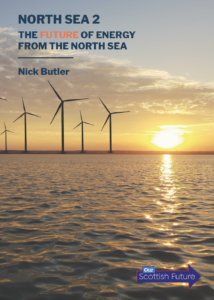OSF report backs new North Sea grid linking offshore wind network to guarantee future for Scottish energy industry.
The second life of the North Sea as a green energy powerhouse could be even more successful than its first phase as a source of oil and gas Gordon Brown says today, as he calls for a new North Sea grid to help deliver low carbon power across Europe.
The call for a grid to connect up a vast new network of offshore wind turbines off the north east coast of the UK is at the centrepiece of a new paper published today by leading energy expert Nick Butler entitled “North Sea 2: The Future of Energy from the North Sea”.
Writing the introduction, Mr Brown says that the development of a North Sea grid is “an idea whose time has now come”.
He declares: “Instead of us being resigned to fewer jobs and wealth coming from the North Sea in the years to come – and the job numbers running down from the current 120,000 – I can see the combination of three sources of energy- wind power, carbon capture and storage and hydrogen – generating more income and employment and Aberdeen enjoying a second renaissance as a centre for the new North Sea of the future.”
Mr Brown backs the proposal by shadow climate change Secretary Ed Miliband to create a new ‘GB Energy company’, saying it could help ensure thousands of new jobs in the green economy are kept in Britain.
Mr Brown concludes: “If we do this well, North Sea 2 could be even more successful for Britain than North Sea 1.”
Today’s paper argues that to develop North Sea 2 the next UK Government needs to deliver a “gradual balanced transition” in the North Sea from an industry focussed on fossil fuels to one delivering clean energy.
Profits from continuing oil and gas development should be used to fund the next generation of low carbon activity, Mr Butler argues.
He says such a gradual transition could deliver five lasting benefits.
· The development of an integrated North Sea electricity grid connecting the UK with Scandinavia, the low countries and France, enhancing security of supplies and reducing the need for back up gas-fired capacity.
· The development of floating wind turbines, located in areas beyond the reach of existing offshore wind facilities.
· The development of carbon capture and storage facilities, allowing emissions from oil and gas to be sunk underground
· The development of hydrogen, especially “green” hydrogen which could be produced from wind power.
· The creation of as many as 200,000 high skilled jobs located in the UK.
Mr Butler says the costs of developing North Sea 2 will be “considerable” and will have to rely on private capital. He concludes that the private sector will only invest if they have confidence in the stability of government support, such as the creation of a distinct UK Continental Shelf tax regime.
He concludes: “The role for government and for entities such as GB Energy should be to establish a clear and enduring fiscal and regulatory framework within which such investment can begin.”
The paper also says that a successful transition can only be achieved if the skills in the current oil and gas sector are retained.
On the plans for a new grid, Mr Brown adds: “Norway is ready to discuss a North Sea grid. Germany has already said it favours such a venture. All the European Union countries including France, Germany, Belgium, and the Netherlands close to the North Sea have much to gain from such an enterprise. Now that the UK has rejoined the North Sea’s wind cooperation group and put offshore wind projects out to tender in a more commercial way, we could start to move forward with confidence.”
“By leading on the North sea grid and making Aberdeen its centre, Britain can be at the forefront of global progress in both offshore wind technology and carbon capture and storage.”
He concludes: “Grids and networks have been very important in economic history – the Romans built roads, the Victorians built railways and the sewage system, and our post 1945 world built telecoms systems, long distance energy supply lines; pipelines, grids and LNG and then the internet. Linkages such as these change the pattern of trade and alters the economics of that trade.”
Notes for editors:
Nick Butler is a visiting professor at King’s College London and the founding chairman of the Kings Policy Institute. He chairs Promus Associates, The Sure Chill Company. From 2007 to 2009 he was chairman of the Cambridge Centre for Energy Studies.
Read the report here









